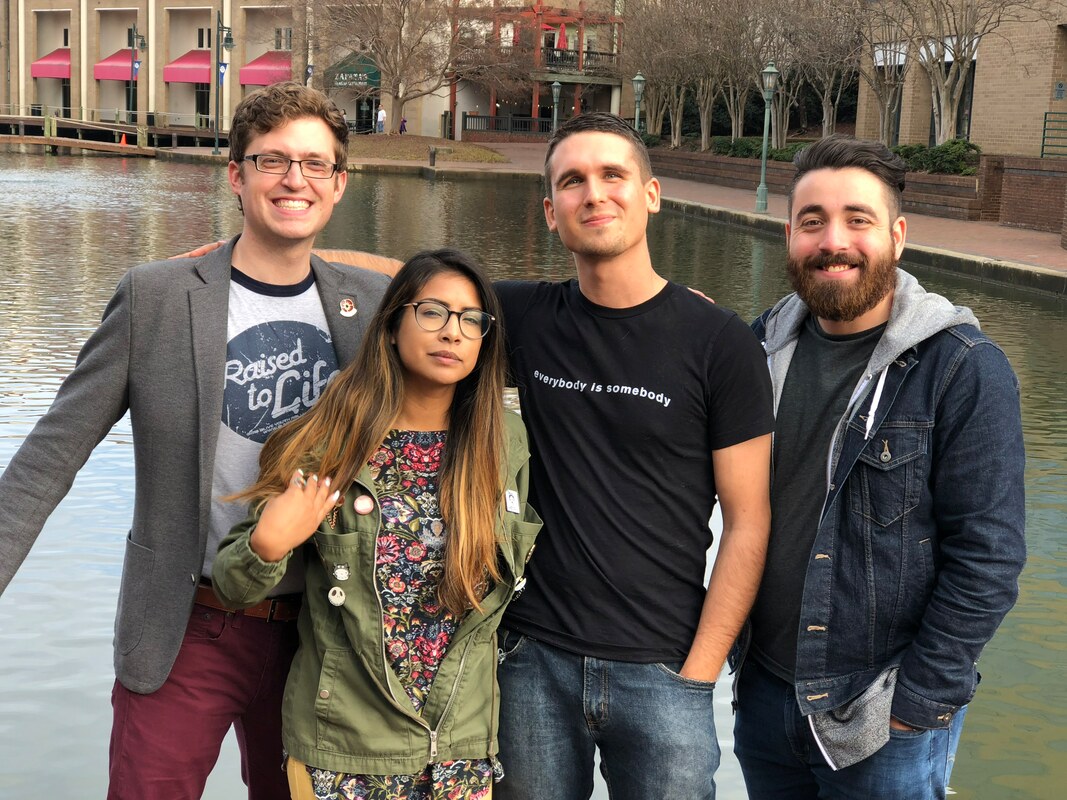Kaleb EiseleCreator, editor, and social media manager of Humans of Adventism. I saw stage lights, wisps of smoke-machine smoke, and dozens of featureless audience heads as I heard the question. “How can we find community after college?” came the host’s voice from the speakers. I hadn’t planned on being on stage that evening. Like everyone else attending the young adult conference that weekend, I’d grabbed a ticket online and made travel plans to attend, hoping to be inspired by the leaders the conference was bringing in. I was humbled when I got the call to appear as a guest on a live podcast recording they were producing Sabbath evening. See, I’ve developed a reputation now. When I attend events like this, I never walk into a room where I don’t know anyone. The series of handshakes and hugs as I greeted several of my friends--some I was meeting face-to-face for the first time--earned me a reasonable amount of teasing. But it hasn’t always been this way. On paper, I should be the person who doesn't know anyone. I live in a country town in South Carolina, far from the vast majority of my Adventist peers. I didn’t join my friends at Andrews, Southern, or any of the big SDA college areas, but moved away with my wife shortly after high school. Yet, if there’s one thing that I am increasingly known for these days, it’s for my love of building community. I started Humans of Adventism from a cell phone in a work truck. Though my physical community was small at the time, I began to grow more and more relationships through what I had: my cell phone. It turned out that I was able to do quite a lot with that, and what was then a page with less than 100 readers developed over the next year and a half into one with over 5,000. No corporate sponsorship, no office, no additional equipment. We underestimate the power we hold in our online content. Used correctly, social media can be used to connect and mobilize an unbelievable amount of people, and the community created there drives real-world changes. Take, for instance, the shirts we designed from the website Teespring. The design was simple: two words, “Adventist. Human.” People read our content, bought the shirts, and wore the message in their own contexts. In Orlando one friend of ours was wearing his in the mall. A woman and her son stopped him and asked if he was familiar with any Adventist churches in the area. The man was able to guide them. Here in Orangeburg my grandparents wear theirs around town. Recently they spoke with someone working at a local fast food place about Adventism, they had questions about some of the content they had seen online. I’ve been stopped numerous times by both Adventists and others to talk about my shirt. Several months ago I met a young man who had taken a new job at our conference. Though he didn’t know anyone there, he recognized one of his coworkers from her story on Humans of Adventism. It gave them common ground to begin a friendship. Non-Adventist friends point to the HoA community as a positive example of Christianity, share our posts, and offer meaningful insight into their own thoughts on religion and God. This, in my opinion, is church. The relationships we are building and things we are doing to spread the gospel together online are a digital manifestation of many of the qualities the early church had. Humans of Adventism is one of numerous emerging ministries that are both sharing the information about God and building relationships with His people. We’re one of many reaching back to and supporting others who are just now starting ministries of their own. Personally, my online church community is what drives me to be involved in my local church. Because I am not dependent on my local church to provide my sense of community, I can reframe how I go about being involved. My local church has become my mission field--a cause I care deeply about, because the pressure for it to fill my spiritual and personal needs is largely alleviated by being involved online.
Because of the power social media can have, it’s crucial that we consider the effects our content will have on our audience. Both our negativity and our positivity grow exponentially as they are spread by our audience and friends online. When it comes to church, we can create a community of people that attack or a community of people that heal. I know which one I’d like to be part of. Related blogs: Kaleb EiseleCreator, editor, and social media manager of Humans of Adventism. You are Adventism. I recently had the opportunity to speak at a large communication conference. As I stood before a room of film workers, bloggers, internet personalities, and communications students, I couldn’t help but reflect on how I’d gotten there. I am not a pastor. I am not an employee of the church at all. I don’t have a degree in communications, and I’ve never been employed, despite my best efforts, in the fields represented at this conference. Yet, there I stood, speaking as a humble authority on digital evangelism. How? Two-and-a-half years ago I graduated from the College of Charleston. I had miraculously been given the opportunity to speak to my classmates and their gathered families, an enormous crowd of people who had no idea who I was. I was not the valedictorian, I’d never worked in student government, and yet again I had managed to land myself on a platform with relatively little tangible merit. On paper, there was no reason to have me speak at my own graduation. Even the professors who knew me well wondered at how this had happened. But it did. While I’ll never know all the intricate aspects of how the events in my life come to be, I’ve learned that many of us have been believing a lie. We often think that titles and money determine our ability to impact the world. To some degree, that’s true. Pastors are invited to speak at evangelistic series far more often than anyone else, business managers handle a large amount of responsibility in the countless companies across America, and celebrities can dramatically shift consumers toward or against the products we buy. But in my experience these aren’t the only ways to impact the world. Early in 2017 I went public with a storytelling Facebook page called “Humans of Adventism.” The mechanics were simple, mostly because my resources were incredibly limited. I had no money, no big names backing the page, and very little ability to do anything outside of what I could manage from my cell phone. I had an idea, and I had my phone. From my work truck I began to conduct interviews. I started with the people I knew--other writers and students, even a few family members. From there I began exploring deeper into the Adventists I found on social media and reaching out to them for their stories. It turned out most people didn’t really care about my qualifications at all, they cared about what I was doing and the effect it was having on the world. The Humans of Adventism community now consists of over 4,000 members and is growing more quickly than ever. I don’t know who made this phrase up, but it’s stuck with me since I heard it. God doesn’t call the qualified, he qualifies those he calls. It’s true. We can own our faith. We can define what it means to be a Seventh-day Adventist. It’s a scary responsibility, but God has also given us so much freedom here. He led me to speak to my fellow graduates, then on to present at the Society of Adventist Communicators conference, among other things. He didn’t make me wait for titles, and I would guess this is true for the rest of us, too. Maybe we’re holding ourselves back. Maybe we already have permission. Is God calling you to realize a digital ministry idea? What's holding you back? Kaleb Eisele is the Social Media Director for the Orangeburg Seventh-day Adventist Church. Humans of Adventism is an independent storytelling platform that shares the lives and perspectives of Seventh-day Adventists. It is entirely funded by its readers. You can sponsor Humans of Adventism for as little as $5/month by visiting patreon.com/adventisthumans, or by purchasing an “Adventist Human” shirt from teespring.com/adventisthuman.
|
Archives
August 2020
Categories
All
|
- Home
- BLOG
-
RESOURCES
-
RESOURCE MENU
>
- ADVENTIST IDENTITY GUIDELINES
- BIG DATA RESOURCES
- BRANDING, IMAGE & DESIGN RESOURCES
- CHURCH/MINISTRY SPECIFIC RESOURCES
- COPYRIGHT & TRADEMARK BASICS
- COURSES
- EMAIL RESOURCES
- GUIDANCE FOR HIRING SOCIAL MEDIA POSITIONS
- PODCASTS
- REPORTS & CASE STUDIES
- SOCIAL MEDIA RESOURCES
- (SOCIAL) VIDEO RESOURCES >
- TEXTING 4 CHURCHES
- TRACKING & ANALTYICS
- WATCH VIDEOS & TUTORIALS
- WEBSITE TIPS
- SOCIAL MEDIA GUIDELINES
-
RESOURCE MENU
>
- SEO
- Digital Discipleship & Evangelism
- COVID-19 RESOURCES
- eNEWSLETTER



 RSS Feed
RSS Feed